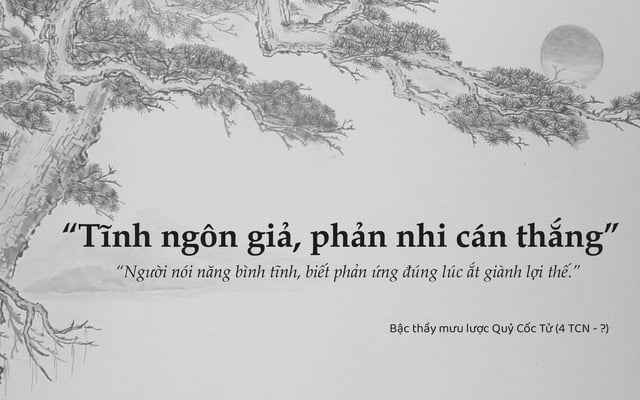
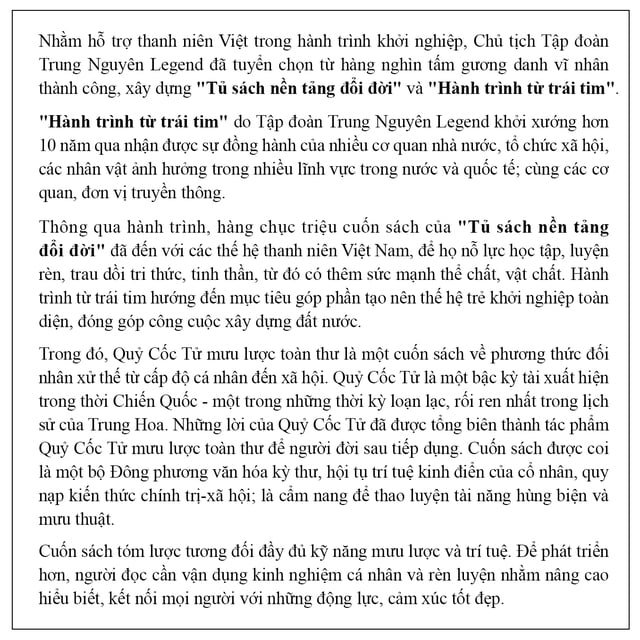
"Quyễn" originally means a scale, implying the weighing of heavy and light, right and wrong, and also indicates flexibility and adaptability in behavior. In Quỷ Cốc Tử's thought, this is the ability to adjust communication strategies after understanding the psychology, reactions and context of the interlocutor. This is the key action step, where the persuader decides on the appropriate way of speaking, attitude and style to achieve the highest efficiency.
Effective communication does not depend on long-winded or imposing words, but on the right person, at the right time, in the right way. When meeting a skeptical person, the words must be concise, sharp, and clear. When meeting a person who likes to show off, you need to be gentle and flexible. When talking to a wise and intelligent person, you need to be profound and knowledgeable; when talking to a scholar, you need to be eloquent and strong; when talking to a noble person, you need to be dignified; when talking to a rich person, you should use elegance and nobility; and when talking to a poor person, you need to emphasize specific benefits. Sometimes, arguing is not about winning or losing, but about provoking thoughts, making the listener realize what needs to be absorbed.
For the art of natural boxing to be effective, it is necessary to skillfully coordinate three senses: eyes observing, ears listening, mouth responding. This combination helps us react flexibly, read hidden signals and adjust messages promptly. The way we speak is as important as the content. Tone of voice, eyes, and expressions, if used at the right time, can all become "weapons" of persuasion. This flexibility is not fake, but the art of mastering the communication space, the situation and ourselves.
During the dialogue, the emotional tone must also be flexible - when it is necessary to be sad, when it is worried, when it is happy, when it is angry - to suit the situation and the goal. Choosing the right style helps the persuader control the main flow of the story and maintain the initiative, even when the situation changes. A correct argument is not necessarily effective if it is given to the wrong person or at the wrong time; only when it is appropriate for the person and at the right time, will the words be most persuasive.
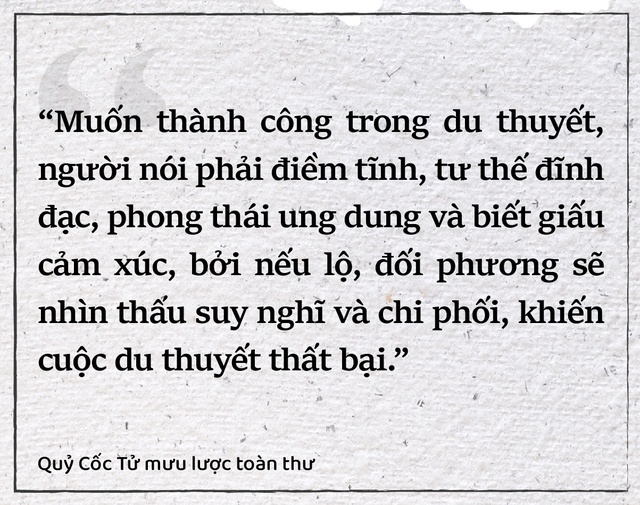
The important principle is to know the limits of words. Not everyone can be persuaded. Some people are not capable of receiving, some are so stubborn that words become useless, even counterproductive. At that time, knowing when to stop, avoid deadlock or change direction appropriately is not a failure, but a manifestation of intelligence. A person who has mastered the art of improvisation will know when to retreat, when to advance, when to speak harshly to confuse the other party and when to be gentle to open the way to negotiation. Speaking less but deeply, speaking at the right time will be more effective than a hundred long words.
Confucius (551-479 BC) is a living testament to this art. He was famous for giving different advice according to each student's personality, avoiding stereotypes. Once, his student Zi Lu asked : "When you hear something that should be done, do you do it right away?" Confucius replied: "You still have a father and brother, ask them first." A few days later, another student, Ran You, also asked the same question, and he replied: "Yes, do it right away." When Gong Xi Hua questioned, Confucius explained: " Zi Lu is hot-tempered and needs to be restrained; Ran You is timid and needs to be pushed." The same question, two answers - that is the art of improvisation based on people and circumstances.

Gui Gu Zi said : "The one who speaks frankly and straightforwardly expresses his opinion, while relying on his own decisiveness and reliability in his words to increase persuasiveness." This principle still holds true: in modern communication, sincerity and courage are often more persuasive than clever words.
Quỷ Cốc Tử also wrote: "A smart person when working will not use his own weaknesses, but often use the strengths of others; not use his own clumsiness and awkwardness but take advantage of the ingenuity and sophistication of others, doing so will make things simple, no longer difficult." Applied in modern life, that is the spirit of knowing how to exploit the intelligence, experience and resources of others to supplement one's own shortcomings. In business, that means learning from competitors, colleagues, and teams to perfect products, services and improve work efficiency.
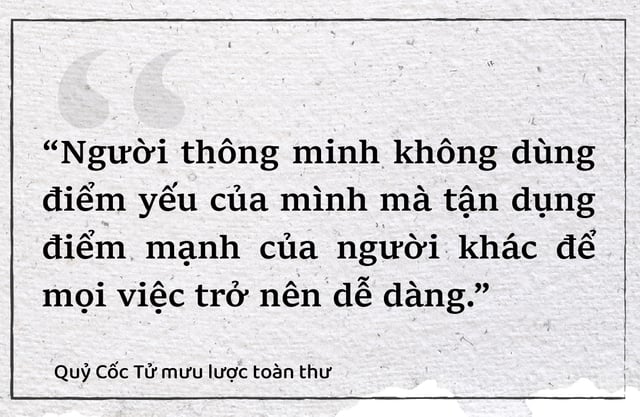
The art of "The Right of Heaven" is not a trick, but an art of balance, empathy and subtle navigation. Those who understand and apply it will avoid stumbling, while maintaining an advantage in communication and leadership. Knowing how to observe at the right time, listen properly, and say the right thing - that is the pinnacle of persuasion, when others voluntarily accompany us without feeling forced.
"Quyen Thien" is the 9th chapter of 12 strategic chapters in the book "Quy Coc Tu's Strategic Strategy Complete Book", carefully selected by Founder - Chairman of Trung Nguyen Legend Group Dang Le Nguyen Vu in the fields of Politics - Diplomacy - Military in the "Life-Changing Foundation Bookshelf".
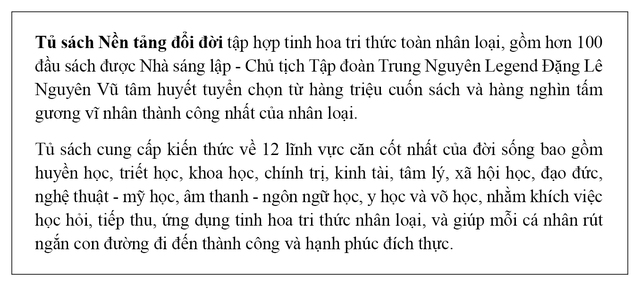
(Read the next episode: Complete Book of Strategies by Guigu Zi - Muo Thien)
Source: https://thanhnien.vn/ky-x-quy-coc-tu-muu-luoc-toan-thu-quyen-thien-185250822154550277.htm








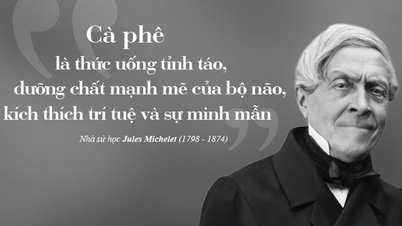



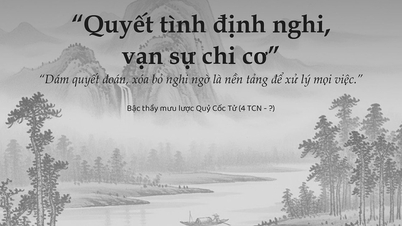


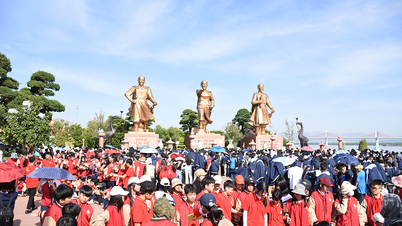



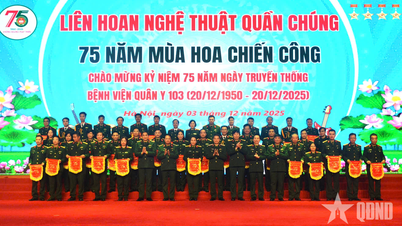




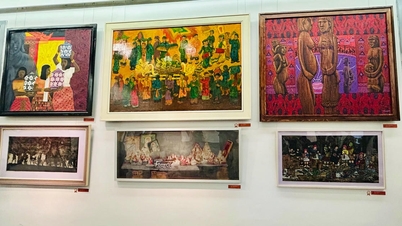










![[Photo] Parade to celebrate the 50th anniversary of Laos' National Day](/_next/image?url=https%3A%2F%2Fvphoto.vietnam.vn%2Fthumb%2F1200x675%2Fvietnam%2Fresource%2FIMAGE%2F2025%2F12%2F02%2F1764691918289_ndo_br_0-jpg.webp&w=3840&q=75)
![[Photo] Worshiping the Tuyet Son statue - a nearly 400-year-old treasure at Keo Pagoda](/_next/image?url=https%3A%2F%2Fvphoto.vietnam.vn%2Fthumb%2F1200x675%2Fvietnam%2Fresource%2FIMAGE%2F2025%2F12%2F02%2F1764679323086_ndo_br_tempimageomw0hi-4884-jpg.webp&w=3840&q=75)
































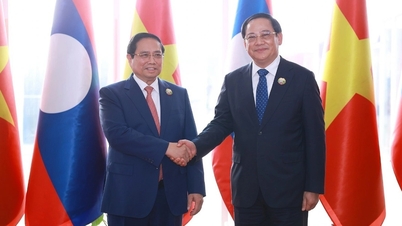




















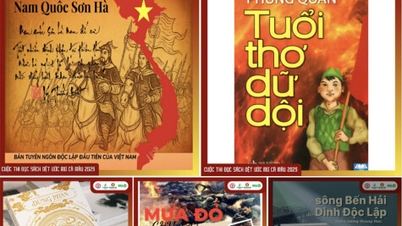



![[Infographic] 3 timelines of the "Quang Trung Campaign"](https://vphoto.vietnam.vn/thumb/402x226/vietnam/resource/IMAGE/2025/12/04/1764800248456_fb_ava-2.jpeg)













Comment (0)